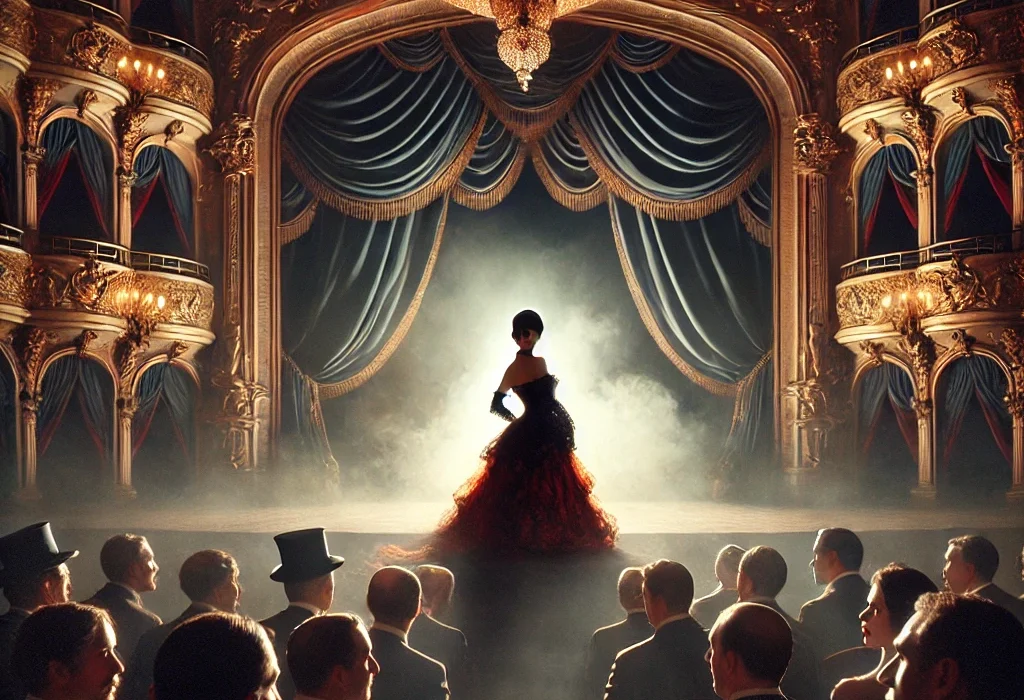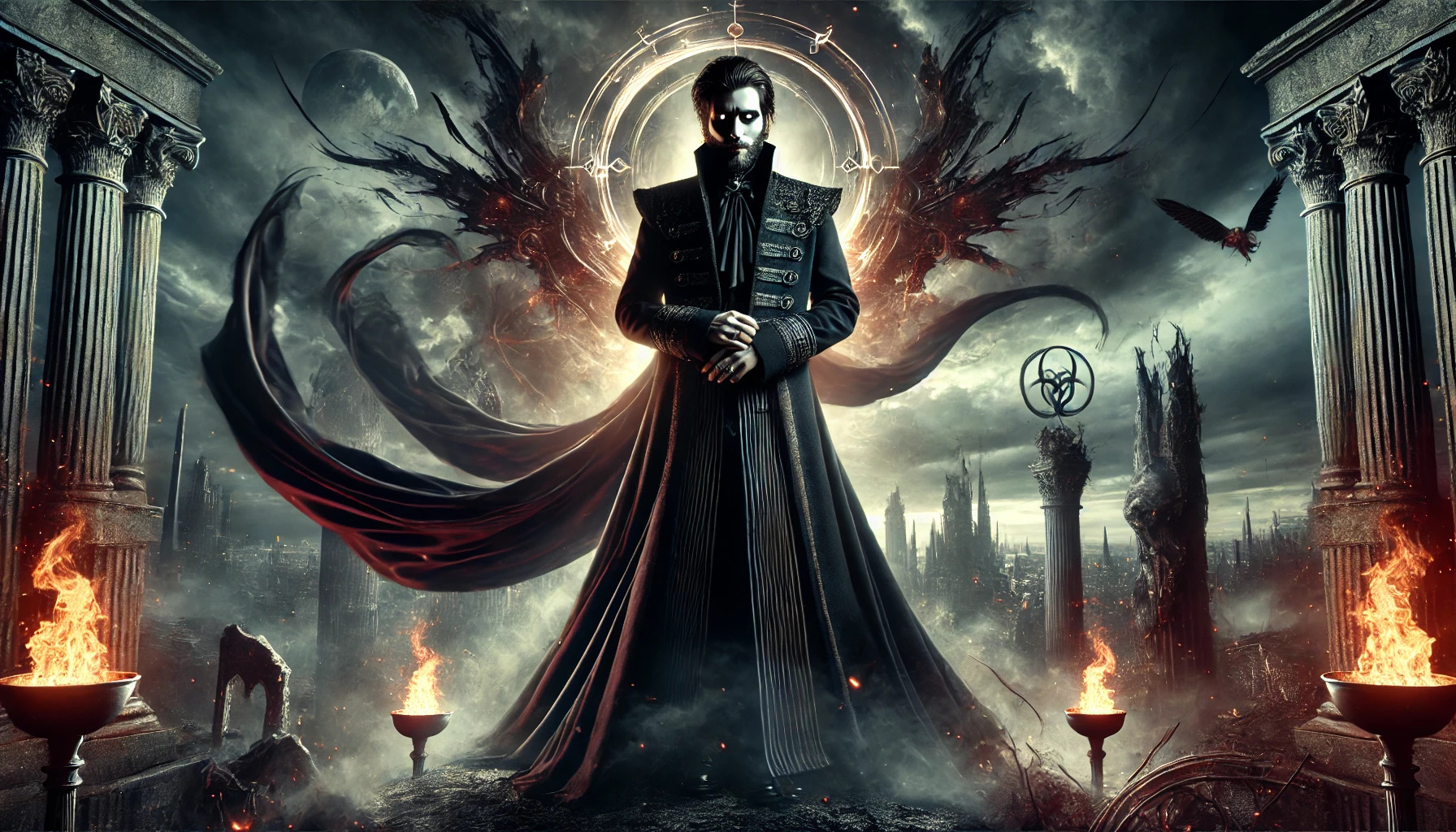Nana by Émile Zola, published in 1880, is a powerful exploration of decadence and societal decay in the final years of the Second French Empire. The novel follows the rise and fall of its eponymous protagonist, Nana Coupeau, a courtesan whose beauty and sensuality captivate and corrupt the men of Parisian high society. As the ninth installment in Zola’s twenty-volume series, Les Rougon-Macquart, Nana serves as a stark commentary on the interplay between heredity and environment, as well as the moral degradation of an entire society.
Plot Summary
In the heart of Parisian nightlife, the Théâtre des Variétés buzzes with excitement as the city gathers to witness the debut of a new star, Nana. She steps onto the stage, embodying the goddess Venus, and instantly seizes the audience’s attention. Though her voice lacks melody and her acting skill is rudimentary, none of it matters. It is her presence—her raw sensuality and the unashamed display of her beauty—that ensnares the spectators. Nana stands tall, her body a vision of curves and confidence, commanding the stage with a power that defies the conventional talents expected of an actress. Her laughter, light and frivolous, tells the audience she is in on the joke, fully aware that her allure lies not in the art of performance but in the promise of desire.
This performance marks the beginning of Nana’s rise, not just as an actress, but as a courtesan whose influence stretches far beyond the theater. Men of wealth and power become her captives, drawn into her orbit by an attraction they cannot resist. Among them is Count Muffat de Beuville, a man of high moral standing and rigid discipline. His world of duty and honor collapses the moment he sets eyes on Nana. What begins as an innocent fascination soon transforms into an all-consuming obsession. He visits her repeatedly, under the guise of charity and patronage, each time sinking deeper into the abyss of his desire. Nana, sensing the power she holds over him, toys with his devotion, pulling him further into her world of decadence and indulgence.
Nana’s allure is like a web, and once a man is caught, escape is nearly impossible. Her lovers are numerous and varied—there’s Steiner, the wealthy banker who showers her with gifts and money, buying her lavish apartments and jewels in hopes of keeping her to himself. There’s Georges Hugon, the young aristocrat, who is so smitten that he abandons his family and responsibilities, falling into a pit of despair when she inevitably loses interest. Nana indulges their fantasies, all the while remaining detached, using their infatuation to propel herself higher up the social ladder. She is like a force of nature, her beauty and sexuality the storm that uproots the lives of those who come too close.
Yet, in her ascent, Nana’s influence is not confined to her immediate circle. She becomes a symbol of the corruption and decay that permeates Parisian society. The men who fall for her are not innocents led astray; they are representatives of a society already steeped in vice and hypocrisy. The wealthy and the powerful flock to her not just for her body but for the escape she offers from the stifling moral codes they outwardly profess to uphold. Nana, in her shameless pursuit of pleasure, mirrors their own suppressed desires and weaknesses, laying bare the duplicity of a world where virtue is merely a facade.
In her luxurious apartment on the Boulevard Haussmann, Nana reigns as a queen of vice. The riches and luxuries bestowed upon her are a testament to her power. Men fight for her favor, showering her with diamonds, furs, and carriages. She drifts from one lover to the next, consuming their fortunes and their spirits with a casual indifference. For Nana, love is not a tender emotion but a transaction, a means to an end. She demands adoration and submission, and when her lovers’ infatuation wanes, she discards them like worn-out trinkets. Georges Hugon’s tragic end—a suicide born of heartbreak—serves as a grim reminder of her capacity for destruction. Yet, Nana is not a villain in the traditional sense. She is a product of her environment, a creature shaped by a society that worships beauty and wealth above all else.
As her fame grows, so does her recklessness. Nana becomes increasingly indifferent to the consequences of her actions. She bankrupts men without a second thought, reducing them to shadows of their former selves. Count Muffat, once a pillar of virtue, falls into a moral abyss. He abandons his wife, Countess Sabine, and gives in to his basest desires, indulging in acts of depravity that scandalize even his closest friends. His transformation is complete; the man who once upheld the strictest codes of honor is now a puppet to Nana’s whims. Yet, even as she brings ruin upon him, Muffat cannot break free from her spell. He is trapped in a cycle of shame and desire, unable to reconcile his love for her with the destruction she has wrought upon his life.
But Nana’s own existence is far from the picture of success and contentment. For all the power she wields over men, she remains fundamentally empty, constantly seeking a satisfaction that eludes her. Her lavish lifestyle, filled with parties, jewels, and admirers, is a gilded cage, trapping her in a perpetual quest for pleasure that leaves her increasingly hollow. She moves from one relationship to the next, from one indulgence to another, driven by a restless energy that knows no peace. Her beauty, the source of her power, also becomes a burden, a constant reminder of the superficial nature of her world.
In the end, Nana’s downfall is as swift as her rise. She contracts smallpox, a disease that ravages her body, destroying the very beauty that has been her weapon and her shield. Her lovers, once willing to sacrifice everything for her, abandon her in her time of need. The apartment on the Boulevard Haussmann, once a palace of vice, becomes her tomb. Alone and disfigured, Nana lies on her deathbed, a grotesque shadow of the goddess who once dazzled Paris. Her death is swift, almost anti-climactic, a stark contrast to the chaos she unleashed in life. In her final moments, the city moves on, indifferent to the demise of the woman who once held it in thrall.
Nana’s legacy is not one of glory but of destruction. She leaves behind a trail of broken men and shattered lives, a testament to the power of beauty and the fragility of the human soul. In the end, she is both a victim and a perpetrator, a woman who rose to power in a society that both created and condemned her. Her story is a reflection of a world obsessed with appearances, where the pursuit of pleasure leads not to happiness but to ruin.
Main Characters
- Nana (Anna Coupeau): A stunningly beautiful but talentless actress who uses her charm and sexuality to manipulate men. She becomes a symbol of the decadence and corruption of the society around her.
- Count Muffat de Beuville: A man of high social standing who becomes infatuated with Nana. His affair with her leads to his moral and social decline.
- Georges Hugon: A young aristocrat who becomes one of Nana’s lovers. His unrequited love for her leads to his tragic end.
- Steiner: A wealthy banker who is captivated by Nana’s allure and spends lavishly to keep her favor.
- Fauchery: A journalist and Nana’s lover who represents the superficiality of the Parisian society that surrounds her.
Theme
- Decay and Corruption: Nana represents the moral and social decay of the Second Empire in France. Her rise to power and influence symbolizes the rot at the heart of society.
- The Power of Sexuality: Nana’s beauty and sensuality give her an almost supernatural power over men, highlighting how sexual allure can be both a weapon and a source of ruin.
- The Ephemeral Nature of Beauty and Fame: Nana’s beauty is her greatest asset, but it is also fleeting. Her rise and fall demonstrate the transient nature of physical beauty and the hollowness of fame built upon it.
- Social Hypocrisy: The novel exposes the hypocrisy of the upper classes who outwardly adhere to moral codes but are privately indulgent in vice and corruption.
Writing Style and Tone
Émile Zola’s writing in Nana is characterized by its naturalistic style, offering a detailed and often unflinching portrayal of its characters and settings. His tone is both critical and detached, presenting the moral decay of his characters without overt judgment but with a sense of inevitability rooted in their environment and choices. Zola’s language is vivid and at times brutally honest, capturing the hedonism and decadence of the world he depicts. His narrative approach involves meticulous observation, immersing the reader in the opulent yet sordid reality of Parisian life.
We hope this summary has sparked your interest and would appreciate you following Celsius 233 on social media:
There’s a treasure trove of other fascinating book summaries waiting for you. Check out our collection of stories that inspire, thrill, and provoke thought, just like this one by checking out the Book Shelf or the Library
Remember, while our summaries capture the essence, they can never replace the full experience of reading the book. If this summary intrigued you, consider diving into the complete story – buy the book and immerse yourself in the author’s original work.
If you want to request a book summary, click here.
When Saurabh is not working/watching football/reading books/traveling, you can reach him via Twitter/X, LinkedIn, or Threads
Restart reading!








